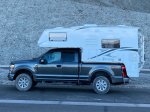::Squish::
Observer
We too had a tacoma and were looking to upgrade.
we were on a budget. We ended up with a one owner F350 SRW diesel and bigfoot 1500 camper.
the truck is close to its payload limit with the Bigfoot and our bigfoot doesn’t have AC or an oven.
our truck is a 2000 7.3 so it’s pre DEF but it’s also dirty and stinks, I hate the smell of both unburned and burned diesel fuel.
While I am happy with the rig we got, and the deal we got it for, if I was to pick out my ideal truck it would not be a diesel especially a post DEF emissions diesel
I am also happy I don’t have a DRW. I don’t want one and I don’t miss it. My dad has the DRW version gas engine version of my truck and while the greater payload would be awesome the wider track and bigger cost put me off of them.
My recommendation; shop the camper first, find out what size you want then shop the truck to have greater payload then the camper plus fuel food water and people and stuff.
most truck camper combos you see are way over weight. Like thousands of pounds over weight.
For camper brands, I like;
bigfoot
northern lite
alaska campers
Our next camper might be an Alaska I like the idea of a pop up but we live on the coast and humidity and mold is a big issue and a fabric pop up would be moldy in about a month
Our 21 year old Bigfoot is starting to show its age, but everything works, it still is water tight. And it held its value pretty well.
our truck is showing it’s age as well eventhough it’s low mileage there’s rust on the body that’s going to cost us some cash to make right and it’s at the time in its life where it needs a lot of little things to keep running, but it was a fraction of the cost of a newer truck so I don’t mind.
we were on a budget. We ended up with a one owner F350 SRW diesel and bigfoot 1500 camper.
the truck is close to its payload limit with the Bigfoot and our bigfoot doesn’t have AC or an oven.
our truck is a 2000 7.3 so it’s pre DEF but it’s also dirty and stinks, I hate the smell of both unburned and burned diesel fuel.
While I am happy with the rig we got, and the deal we got it for, if I was to pick out my ideal truck it would not be a diesel especially a post DEF emissions diesel
I am also happy I don’t have a DRW. I don’t want one and I don’t miss it. My dad has the DRW version gas engine version of my truck and while the greater payload would be awesome the wider track and bigger cost put me off of them.
My recommendation; shop the camper first, find out what size you want then shop the truck to have greater payload then the camper plus fuel food water and people and stuff.
most truck camper combos you see are way over weight. Like thousands of pounds over weight.
For camper brands, I like;
bigfoot
northern lite
alaska campers
Our next camper might be an Alaska I like the idea of a pop up but we live on the coast and humidity and mold is a big issue and a fabric pop up would be moldy in about a month
Our 21 year old Bigfoot is starting to show its age, but everything works, it still is water tight. And it held its value pretty well.
our truck is showing it’s age as well eventhough it’s low mileage there’s rust on the body that’s going to cost us some cash to make right and it’s at the time in its life where it needs a lot of little things to keep running, but it was a fraction of the cost of a newer truck so I don’t mind.
Last edited:

